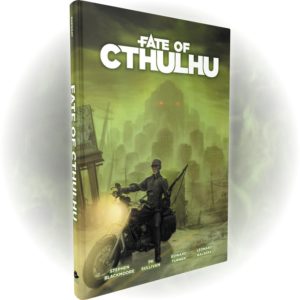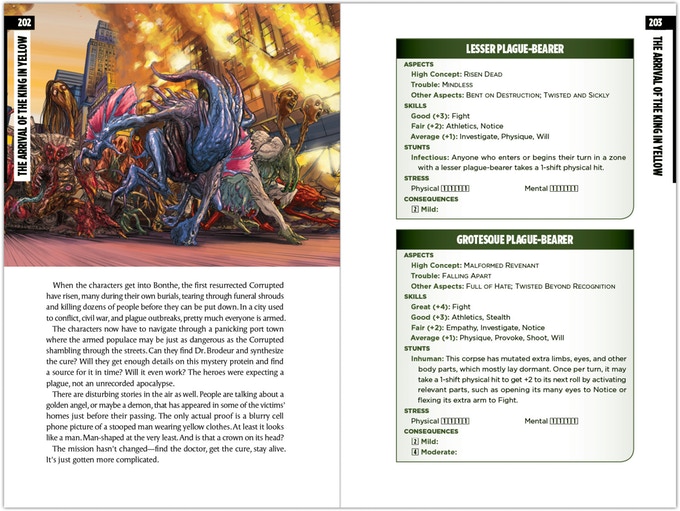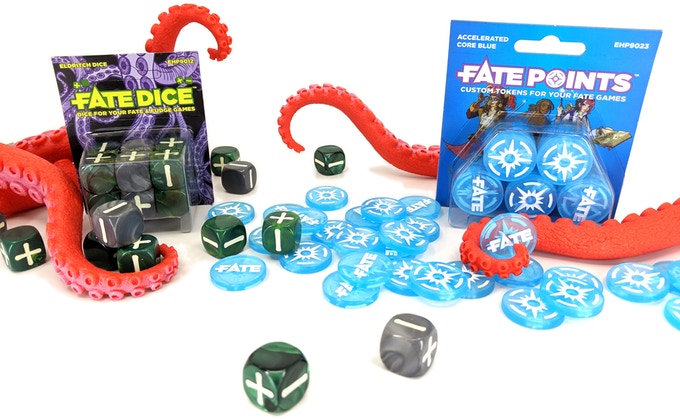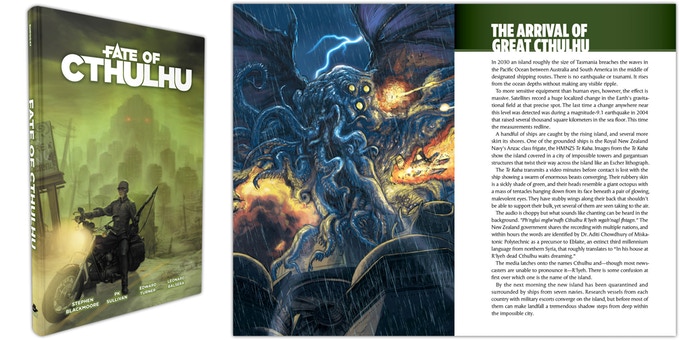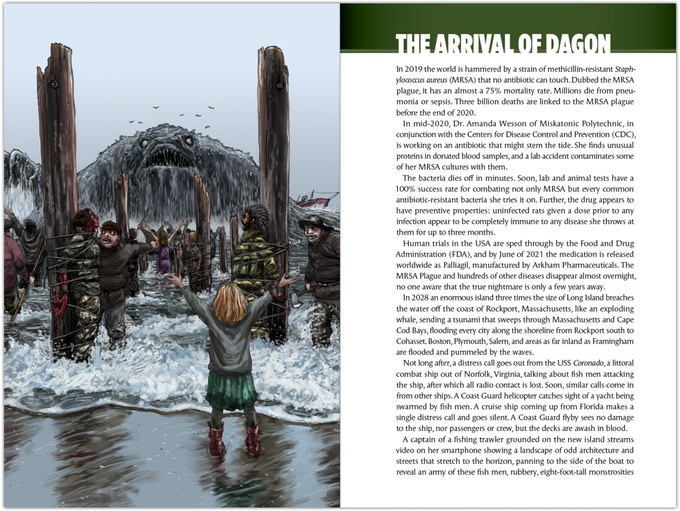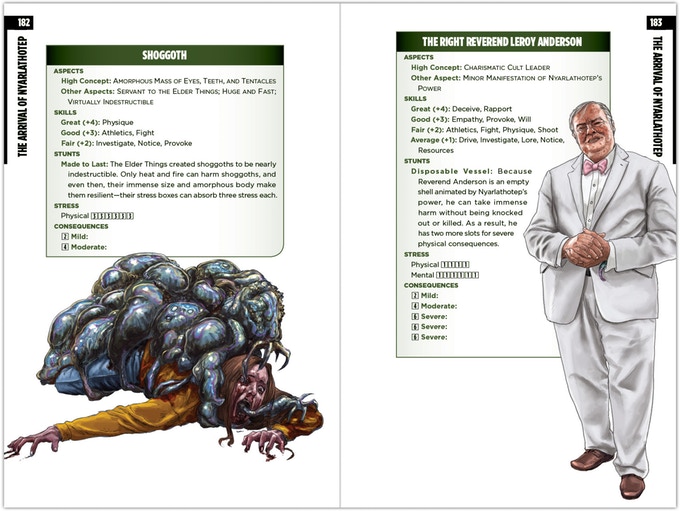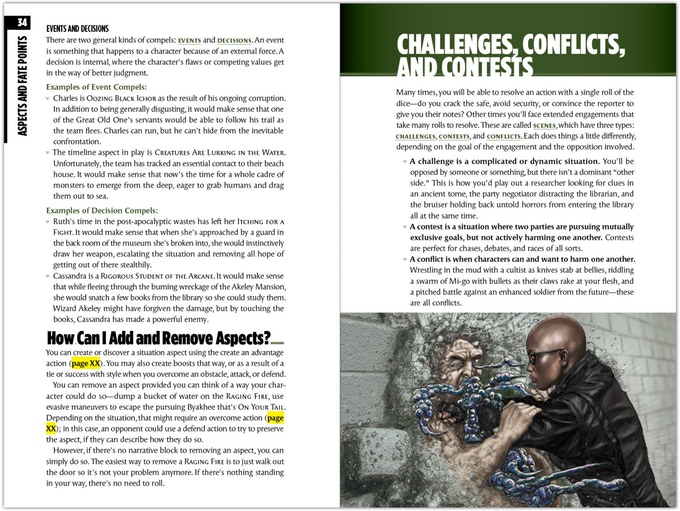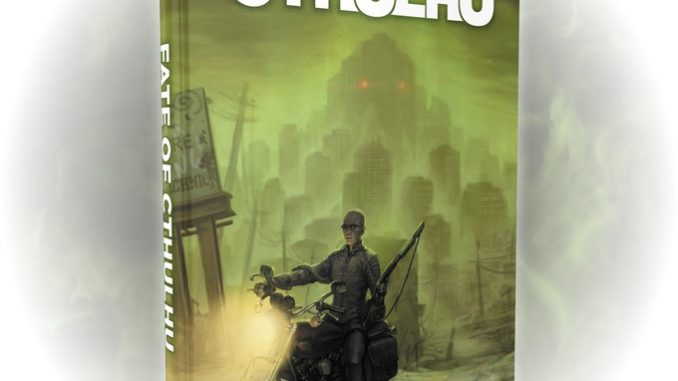
On Kickstarter, Evil Hat Productions is crowdfunding Fate of Cthulhu, a re-envisioning of the Cthulhu Mythos for your tabletop using the Fate Core system. To get a sense of the game and the campaign, I spoke to five members of the Evil Hat crew: Fred Hicks, President of Evil Hat; Sophie Lagacé, Line Development & Project Management; Ed Turner, System Development; Stephen Blackmoore, Creative Direction; and Tom Lommel, Marketing & Social Media.
EGG EMBRY (EGG): Thanks for breaking away from the campaign to talk about your Great New One. What can you tell me about Fate of Cthulhu?
ED TURNER: It’s the end of the world; civilization as you know it has collapsed, the Earth has been overtaken by innumerable horrors following the will of an impossibly powerful cosmic menace, and what few dregs of humanity still remaining are being corrupted into monsters themselves. In Fate of Cthulhu, the worst has already come to pass. But while there’s no coming back from the end of the world, we might be able to prevent it; a combination of human ingenuity and the space- and time-warping nature of Yog-Sothoth has allowed the remaining enclaves of humanity to send a few brave heroes into the past. Just a decade, but it might be enough to prevent the end of the world from coming to pass. Or maybe just make it a little less awful.
Fate of Cthulhu is a Fate Core-powered game about those time travelers, fighting to prevent a Great Old One from coming to power. The PCs have a timeline of events leading to the rise of the Great Old One, but of course, not only is their information often misleading, their own actions will ripple outward—their success or failure dealing with one event will cause the others to change in unpredictable ways. In some senses, it’s a very hopeful take on Cthulhu mythos… the core concept is that you can prevent the apocalypse from happening, after all, and the characters are generally able and empowered. But it’s still Cthulhu, so the odds are very good that you can’t fix everything, and you might just lose your humanity in the process.
EGG: The pitch has the feel of James Cameron’s Terminator. While your game is *not* making use of the Terminator property, what sparked the idea of mixing premises?
FRED HICKS: It was a straight line between the two. Chris and I were talking about licenses that would be too much hassle, and that turned into talking about the parts of it that we loved. Once I looked at those parts I realized there were some resonances with the Mythos, which immediately sparked the idea of Cthulhu operating with Skynet’s playbook. That’s the starting point we handed over to the team.
SOPHIE LAGACÉ: The original idea came from Evil Hat Productions’ president Fred Hicks and then-partner Chris Hanrahan. It started, like all our games, encapsulated in a simple pitch: “Create a Terminator-like game where Cthulhu is Skynet.” From this simple idea, we put it through a go/no-go process, including answering four basic questions we always ask of potential projects:
- What problem does the product solve? (Bring a fresh take to the Mythos, with the kind of spin and shine that Evil Hat can put on a property, where the fun is maintained and the flavor is both familiar and new at once.)
- Does it create any new problems? (We need to find the right mix to do horror in Fate, and we need to avoid copyright pitfalls and stick to public domain inspirations.)
- Can we create the product at a good price? (Yes.)
- Can we pay our talent decent wages? (Yes.)
The development team created a vision document spelling out the goals, schedule, resources, team, scope, and finished book’s requirements and got to work. Just to give you an idea of how we produce a game: This was in the pipeline for about 3 years.
EGG: Most Cthulhu Mythos games use varying versions of an insanity meter. Yours goes a different route, correct?
STEPHEN BLACKMOORE: Sanity as a game mechanic has always rubbed me the wrong way. Aside from it being frankly ridiculous (“I’ve read the dreaded Necronomicon and now I will roll on the DSM V chart to see what I get!”) there’s a level of disrespect in it.
We all know someone who’s struggling with mental health even if we don’t know it. I didn’t want to go near that and neither did anyone else.
So instead we have Corruption. The Great Old Ones leave a mark on all who encounter them. Literally.
SOPHIE LAGACÉ: The key question in Fate is not “Can you succeed?” so much as “What are you willing to sacrifice in order to succeed?” In Fate of Cthulhu, you can choose to use the Great Old Ones’ technology and power to fight them, but at the cost of embracing the horror. You can allow an aspect to become corrupted in order to gain extraordinary abilities like Alien Muscle Grafts or Extruded Bone Daggers, but it changes you on a fundamental level. You can add to these powers by corrupting your aspects one by one, becoming more and more powerful. But when you take that last step, when your last aspect is corrupted, you are no longer human. You become a servant of the Great Old Ones.
Incidentally, time travel is in fact Great Old One technology and using it causes corruption, so if you decide to create a Kyle Reese-like character who has seen the terrifying future and came back in time to stop it, you already have one corrupted aspect and the super-ability that comes with it.
EGG: What makes Fate Core the right system for this setting?
ED TURNER: Fate Core is a system that naturally creates competent and proactive characters; that might seem like an unusual choice for a Cthulhu-Mythos game, but you’ll be playing people who have battled time itself in an effort to prevent an inevitable apocalypse orchestrated by an unimaginably powerful Great Old One. So yeah, pretty competent and proactive.
More to the point, one of the things that Fate is very good at is allowing you to create unique and interesting characters and allowing those characters to change over time. When you’ve got time travel and eldritch beasties, there are naturally going to be a lot of weird and amazing character concepts, more than we could possibly predict. But Fate handles weird really well. Say two people want to play the same character, one from the present and the other from a post-apocalyptic future? Not only does Fate allow for that, it can give that relationship actual mechanical weight, and not just flavor. And if that relationship changes in the story—if you decide that your future self is a huge jerk and you don’t want to turn into them—then that change has mechanical weight too, and changes the sorts of benefits and troubles that come from your character concept.
Not only is that great on its own, it’s the backbone of the corruption system; when you gain those extraordinary abilities, you lose a measure of your humanity in exchange.
EGG: For those that do not know, can you give a quick overview of Fate’s core [ha!] mechanics, and why it’s such a popular system?
ED TURNER: Probably the most defining feature of Fate is the use of aspects. Aspects are short, descriptive statements about things that are important to a character or a situation. “Powered by Mi-Go Cybernetics” or “I Need to Protect the Past Version of Myself,” for instance, are two aspects a character might have. Aspects are truths about the world, and they determine narrative position—most humans can’t interface with Mi-Go tech, but if you ARE Mi-Go tech you could give it a try. They can help you: if you have an aspect that would benefit you and a roll, you can spend one of your limited supplies of Fate points to invoke it and get a bonus. And they can complicate your life: if you have an aspect that might complicate a situation, the GM can compel it, offering you a fate point if that aspect forces you to make a bad decision or suffer an unwanted consequence—maybe your cybernetics short out, or maybe you decide to abandon a mission because your past self is in danger. Compels are important, because they make adventures dynamic: problems crop up, and because they’re based on a character’s aspects, you know the problems matter to the characters. And players can propose compels as well, giving them power to push the narrative in interesting directions. I think that’s a good part of what makes it so popular: aspects allow you to make characters in basically any genre and have them immediately be interesting, useful, and swimming in story hooks.
Of course, there are many other elements of the system, but rather than going over them in any depth, I’m going to mention one of the other things that makes Fate great: how accessible it is. Fate Core is available as a Pay-What-You-Want PDF, or you can read the rules at the online SRD. If you’re interested in Fate Core, you can take a look right now.
EGG: Will players need to own Fate Core to play this game?
SOPHIE LAGACÉ: No, it’s a standalone game, all the rules are in the book. In fact, contributors at the $10 level and higher can immediately check out the rules by downloading the prototype edition, which is complete except for the features we’re funding through this Kickstarter campaign: additional art, proofreading, indexing. If the rules are not clear, now is a good time to tell us!
EGG: Any plans to develop a Fate Accelerated version?
SOPHIE LAGACÉ: We don’t see a big hurdle in adapting Fate Core’s skills to Fate Accelerated’s approaches, but it’s been a popular request, so we had Ed Turner pen a Fate Accelerated conversion. It’s just a few pages and is now available as a free PDF for backers of the campaign. How’s that for plans? 😃
EGG: Perfect! Tell me about the creative team. Who is developing Fate for this game? Who is handling the worldbuilding? What are some of the cooler bits about this world?
SOPHIE LAGACÉ: The original vision comes from Fred Hicks and then-partner Chris Hanrahan. We entrusted creative direction to Stephen Blackmoore, who is a talented writer of action horror novels (check out his most recent, Fire Season, for example.) Stephen also wrote the setting material, the narrative part of the book, and particularly, the five timelines we present in Fate of Cthulhu.
For system development, we turned to Fate virtuoso PK Sullivan, who has done a wonderful job of creating the scaffolding to support the vision and fiction, including new rules for time travel, Elder God technology, corruption, heroic sacrifice, and so forth.
Towards the final stages we brought in Fate developer emeritus Leonard Balsera, who helped organize the revisions in response to the beta playtest results, and designer Edward Turner, who created the examples of play, the NPC stats, and helped PK with some rules refinements.
It’s now our policy to have a sensitivity consultant, but with a book based on the Lovecraftian mythos, it was especially important. We were particularly concerned about HPL’s virulent racism and about the long-time association of the Mythos with “insanity,” as well of course as our own unconscious biases. We consulted with Misha Bushyager, who not only provided the sensitivity reading but helped us articulate our position by writing an introduction section.
For editing we called on the services of veteran Fate editor Josh Yearsley, who was super helpful in getting us to be consistent and clear. And the project oversight was done by Director of Projects Sean Nittner and Project Manager/Line Developer Sophie Lagacé.
EGG: You have a number of stretch goals from some exceptional creators. Which ones are you most excited about?
SOPHIE LAGACÉ: Hmm, it’s hard to choose a favorite. We put together an amazing roster of authors that might not have had the immediate availability to write an entire book, but were able to join the team to write one timeline. We talked through the concepts and matched them to apocalypses they were excited about writing, so I really feel this will be a stellar collection — the stars are right!
Whitney “Strix” Beltran (Bluebeard’s Bride) will be writing the timeline for The Colour Out of Space, Mabel Harper tackles Azathoth, Alastor Guzman (The Maze) will be doing Yig. Those are all unlocked. On deck we have Kira Magrann (Something Is Wrong Here) uttering Hastur’s name, Ash Cheshire ((Abyssal)) invoking Yog-Sothoth; and more exciting stretch goals (not necessarily all tightly Mythos-based) to be announced on Tuesday, May 14.
EGG: With one of the stretch goals, you’ve committed “to providing an open-licensable version of the system.” What can developers expect from this open-license?
SOPHIE LAGACÉ: You can think of it as a shorter version of the Fate Core SRD, with a level of detail similar to what Fate Accelerated does while providing skills and stunt examples. That makes it much more portable for designers who want to write standalone Fate-based games. It shrinks the page count dedicated to basic Fate rules from 80 or so pages down to about 30. Plus, we will make our Fate of Cthulhu-specific rules available, as we have done previously with other Kickstarter campaigns.
EGG: A few months ago, I reported on Fria Ligan’s The Call of Cthulhu – Illustrated by Baranger, which is an illustrated version of the original CoC short story that includes an original Cthulhu-centric roleplaying game. In the comments, a fan asked a version of “Isn’t there a Cthulhu RPG already?” With full games and expansions ranging from Call of Cthulhu to Achtung! Cthulhu to Convicts & Cthulhu to Trail of Cthulhu to Age of Cthulhu and more, the market has embraced Cthulhu like nothing other than D&D’s vision of sword and sorcery, that’s to say it’s a popular subgenre with many options. All of that said, how would you pitch this game to a fan that’s experiencing choice overload? What’s the secret that will make this the go-to Mythos game?
SOPHIE LAGACÉΩΩ: Most games lean into the despair that infuses Lovecraft’s writings. Fate of Cthulhu gives you the hope — however tenuous — of not merely staving off the apocalypse, but maybe, just maybe, making things better. The Great Old Ones are still a horrific, powerful threat, and you may have to die — or worse — for your cause, but you get to fight back against the forces of destruction.
In most Mythos-based RPGs, the more your character learns, the more they decay – in both sanity and competence. In Fate of Cthulhu, the corruption mechanics mean your character becomes both more powerful and able to fight the monsters of the Elder Gods, but each step in pursuit of that power means they’re that much closer to becoming a monster themselves.
Finally, the time travel rules we’ve built in really make for an original take on the Lovecraftian genre. We begin the game where most other RPGs naturally end: with the rise of the Elder Gods. The time travel element means we can spin out a lot of variations on that premise. With Fate of Cthulhu, you can play an even darker version of Terminator, Travelers, or Twelve Monkeys.
EGG: For fans interested in this Kickstarter, where can they go to learn more? Where can they find more about Evil Hat Productions’ products?
TOM LOMMEL: The best place to stay up to date is of course, the Fate of Cthulhu Kickstarter page where we keep everyone updated. We’re in the final week of the campaign and that means it’s time to lay our cards on the table and show everyone the exciting stretches we have in store for the final push. For up to the minute updates, the Evil Hat official Twitter account is always popping with what’s current at the Hat – both the Kickstarter, our other games, and retweets of actual plays and podcasts featuring them all. And of course, the central source of info on everything Evil Hat is our website at www.evilhat.com.
Fate of Cthulhu by Evil Hat Productions
ENDS: Tue, May 21 2019 3:30 PM EDT.
https://www.kickstarter.com/projects/evilhat/fate-of-cthulhu
Latest posts by Egg Embry (see all)
- New Gamemaster Month 2023 - January 20, 2023

